江苏省新沂市第二中学高三英语 专题复习 Unit 2 Wish you were here学案
- 格式:doc
- 大小:299.50 KB
- 文档页数:16
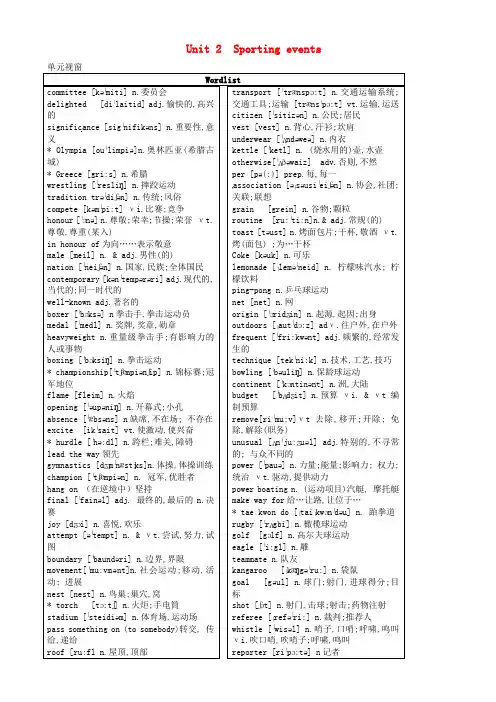
Unit 2 Sporting events单元视窗Wordlistcommittee [kəˈmiti] n.委员会delighted [diˈlaitid] adj.愉快的,高兴的significance [sigˈnifikəns] n.重要性,意义* Olympia [ouˈlimpiə]n.奥林匹亚(希腊古城)* Greece [gri:s] n.希腊wrestling [ˈresliŋ] n.摔跤运动tradition trəˈdiʃən] n.传统;风俗compete [kəmˈpi:t] νi.比赛;竞争honour [ˈɔnə] n.尊敬;荣幸;节操;荣誉νt.尊敬,尊重(某入)in honour of为向……表示敬意male [meil] n. & adj.男性(的)nation [ˈneiʃən] n.国家,民族;全体国民contemporary [kənˈtempərəri] adj.现代的,当代的;同一时代的well-known adj.著名的boxer [ˈbɔksə] n拳击手,拳击运动员medal [ˈmedl] n.奖牌,奖章,勋章heavyweight n.重量级拳击手;有影响力的人或事物boxing [ˈbɔksiŋ] n.拳击运动* championship[ˈtʃæmpiənʃip] n.锦标赛;冠军地位flame [fleim] n.火焰opening [ˈəupəniŋ] n.开幕式;小孔absence [ˈæbsəns] n缺席,不在场; 不存在excite [ikˈsait] vt.使激动,使兴奋* hurdle [ˈhə:dl] n.跨栏;难关,障碍lead the way领先gymnastics [dʒɪmˈnæstɪks]n.体操,体操训练champion [ˈtʃæmpiən] n. 冠军,优胜者hang on (在逆境中)坚持final [ˈfainəl] adj. 最终的,最后的n.决赛joy [dʒɔi] n.喜悦,欢乐attempt [əˈtempt] n. & νt.尝试,努力,试图boundary [ˈbaundəri] n.边界,界限movement[ˈmu:vmənt]n.社会运动;移动,活动; 进展nest [nest] n.鸟巢;巢穴,窝* torch [tɔ:tʃ] n.火炬;手电筒stadium [ˈsteidiəm] n.体育场,运动场pass something on (to somebody)转交, 传给,递给transport [ˈtrænspɔ:t] n.交通运输系统; 交通工具;运输 [trænsˈpɔ:t] vt.运输,运送citizen [ˈsitizən] n.公民;居民vest [vest] n.背心,汗衫;坎肩underwear [ˈʌndəweə] n.内衣kettle [ˈketl] n. (烧水用的)壶,水壶otherwise[ˈʌðəwaiz] adv.否则,不然per [pə(:)] prep.每,每一association [əˌsəusiˈeiʃən] n.协会,社团;关联;联想grain [grein] n.谷物;颗粒routine [ru:ˈti:n]n.& adj.常规(的) toast [təust] n.烤面包片;干杯,敬酒νt.烤(面包) ;为…干杯Coke [kəuk] n.可乐lemonade [ˌleməˈneid] n. 柠檬味汽水; 柠檬饮料ping-pong n.乒乓球运动net [net] n.网origin [ˈɔridʒin] n.起源,起因;出身outdoors [ˌautˈdɔ:z] adν.往户外,在户外frequent [ˈfri:kwənt] adj.频繁的,经常发生的technique [tekˈni:k] n.技术,工艺,技巧bowling [ˈbəuliŋ] n.保龄球运动continent [ˈkɔntinənt] n.洲,大陆budget [ˈbʌdʒit] n.预算νi. & νt编制预算remove[riˈmu:v]νt去除,移开;开除; 免除,解除(职务)unusual [ʌnˈju:ʒuəl] adj.特别的,不寻常的; 与众不同的power [ˈpauə] n.力量;能量;影响力; 权力;统治νt.驱动,提供动力power boating n. (运动项目)汽艇, 摩托艇make way for给…让路,让位于…* tae kwon do [ˌtaiˌkwɔnˈdəu] n. 跆拳道rugby [ˈrʌgbi] n.橄榄球运动golf [gɔlf] n.高尔夫球运动eagle [ˈi:gl] n.雕teammate n.队友kangaroo [ˌkæŋgəˈru:] n.袋鼠goal [gəul] n.球门;射门,进球得分;目标shot [ʃɔt] n.射门,击球;射击;药物注射referee [ˌrefəˈri:] n.裁判;推荐人whistle [ˈwisəl] n.哨子,口哨;呼啸,鸣叫νi.吹口哨,吹哨子;呼啸,鸣叫unfair [ʌnˈfeə] adj.不公正的,不公平的bitter [ˈbitə] adj.愤愤不平的;令人不快的;味苦的;严寒的meanwhile [ˈmi:nˈwail] adν.与此同时; 在此期间tie [tai] vt.打成平局; (用绳、线)系, 绑,捆precious [ˈpreʃəs] adj.宝贵的,珍贵的把你没有记牢的挑出来,好好滴记住哦!dreamt that the Olympics would make it possible for people of all countries to live side by side in peace. Now people all over the world are helping to realize this dream. Among them are many well-known athletes.Did you know that perhaps the most famous boxer of all time first came to public attention during the 1960 Rome Olympics? He won the gold medal for the USA, under his birth name Cassius Clay. Afterwards, this young man went on to win the World Heavyweight Boxing Championship in 1964 and later changed his name to the one we all know, Muhammad Ali. He returned to the Olympic Games in Atlanta in 1996 to light the Olympic flame at the opening ceremony.Another sports star I would like to mention is Michael Jordan. Everyone knows of his success in the NBA, but do you know that he helped the USA basketball team win the gold medal at the 1984 Los Angeles Olympics? Jordan also returned to the Olympics after many years, but unlike Muhammad Ali, he was still competing for medals. At the 1992 Barcelona Olympics, Jordan won his second Olympic gold medal as a member of the so-called 'Dream Team'.Chinese athletes have also made important contributions to the Olympic Games. At the 1984 Los Angeles Olympics, the People's Republic of China returned to the Olympics after 32 years' absence. I am sure the whole of China must have felt proud when Xu Haifeng won the first gold medal for his country. Deng Yaping, who won four Olympic gold medals in 1992 and 1996, is perhaps the greatest female table tennis player the world has ever seen. At the 2004 Athens Olympic Games, Liu Xiang excited people all over Asia when he became the first Asian to win the gold medal in the men's 110-metre hurdles.The Chinese led the way at the 2008 Beijing Olympics, winning 51 gold medals. For the first time in history, the Chinese women's gymnastics team won the gold medal. However, the athlete that some people remember most was Zhang Ning, a former badminton champion. At the age of 33, she was much older than the other players. Yet, she hung on to win the gold medal in the final match.These are some of the Olympic athletes who have brought joy to people across the world with their attempts to push the boundaries of human achievement. We are looking forward to seeing more of them in future Olympic Games. Join me in wishing the Olympic Movement a successful future to match its past glory.Thank you. Now, are there any questions?First periodListen and learn:Listen to the wordlist and try to learn the words and phrases by heart.◆Step 1:◆Step 2: Personal show●Task 1: Give the following words’ Chinese meaningtradition n. hang onboundary n. transport n. vt.association n. origin n.referee n. bitter adj.●Task 2: Translate the following wordsn. 冠军,优胜者n. & νt.尝试,努力,试图n.预算νi. & νt编制预算νt去除,移开;开除; 免除,解除(职务)adν.与此同时; 在此期间adj.宝贵的,珍贵的Step 3: Text reading Listen to the text and then finish the following sentences ●Task: Task-based reading阅读课文, 完成下表。
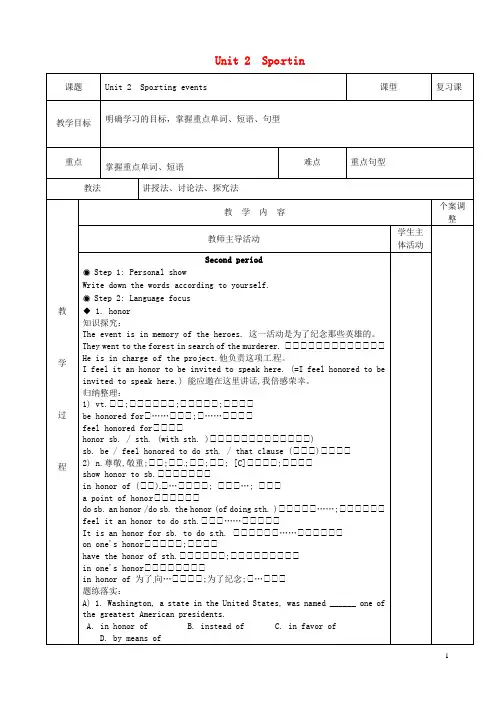
Unit 2 Spo rtin课题Unit 2 Spo rting events课型复习课教学目标明确学习的目标,掌握重点单词、短语、句型重点掌握重点单词、短语难点重点句型教法讲授法、讨论法、探究法教学过程教学内容个案调整教师主导活动学生主体活动Second periodStep 1: Personal showWrite down the words according to yourself.Step 2: Language focus◆ 1. honor知识探究:The event is in memory of the heroes. 这一活动是为了纪念那些英雄的。
They went to the forest in search of the murderer. 他他他他他他他他他他他他他He is in charge of the project.他负责这项工程。
I feel it an honor to be invited to speak here. (=I feel honored to beinvited to speak here.) 能应邀在这里讲话,我倍感荣幸。
归纳整理:1) vt.他他;他他他他他他;他他他他他;他他他他be honored for他……他他他;他……他他他他feel honored for他他他他honor sb. / sth. (with sth. )他他他他他他他他他他他他他)sb. be / feel honored to do sth. / that clause (他他他)他他他他2) n.尊敬,敬重;他他;他他;他他;他他; [C]他他他他;他他他他show honor to sb.他他他他他他他in honor of (他他)他…他他他他; 他他他…; 他他他a point of honor他他他他他他do sb. an honor /do sb. the honor (of doing sth. )他他他他他……;他他他他他他feel it an honor to do sth.他他他……他他他他他It is an honor for sb. to do s th. 他他他他他他……他他他他他他on one's honor他他他他他;他他他他have the honor of sth.他他他他他他;他他他他他他他他他in one's honor他他他他他他他他in honor of 为了向…他他他他;为了纪念;他…他他他题练落实:A) 1. Washington, a state in the United States, was named ______ one ofthe greatest American presidents.A. in honor ofB. instead ofC. in favor ofD. by means ofC) 2. While in London, we paid a visit to the hospital founded in _______of the nurse Florence Nightingale.A. needB. favorC. honorD. placeA) 3. The President ______ them with his visit.A. honoredB. in honor ofC. have the honor ofD. honor◆ 2. bring back 带回,归还,恢复;使回忆起知识探究:1) The old photograph brought back many memories. 这张旧照片引起许多回忆。
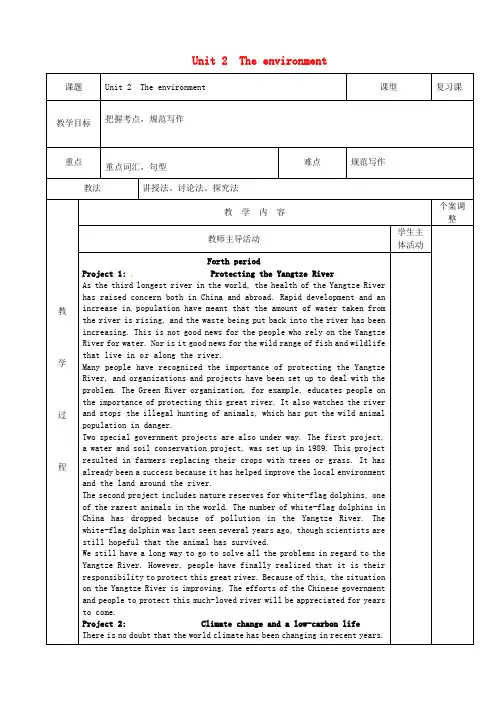
Unit 2 The environmentpopulation have meant that the amount of water taken from that live in oand stops the illegal hunting of animals, which has put the wild animalMany people blame this change on gases such as carbon dioxide. Animalsand humans produce carbon dioxide when they breathe. However, many otherhuman activities also let off carbon gases. Anytime something is burnt,carbon is put into the atmosphere. Cars and other vehicles burn petrolin their engines, and electrical power plants most often burn fuels suchas coal and oil in order to produce electricity. Therefore, the more petroland electricity we consume, the more carbon we are letting off.One thing we can all do to help solve this problem is to walk or use abicycle when possible. Although we produce carbon when we breathe, thecarbon we produce is much less than that produced by a car. Of course,there are times when we need to travel long distances. In this case, publictransport such as buses and the underground are always much better choicesthan a private car or a taxi. If you must drive a car, it is never goodto travel alone—you should try to find other people to travel with you.At home, you should use as little energy as possible. Turn off the lightsand anything else electrical when not in use. Since factories use a lotof energy and also let off carbon gases, it is important to recycle asmuch as possible. In particular, metal products and paper p roductsrequire a lot of energy to produce, so you should find ways to use theseagain without throwing them away.Last but not least, you can plant a tree, because trees absorb the carbondioxide in the air to produce oxygen. Planting a small tree is cheap andeasy, and two decades from now, when you look at what will have becomea large tree, you will find a sense of satisfaction knowing that you didyour part to help solve the problem of climate change.Step 1: Read and learn◆ Listen to the text and grasp the general spirit of the textLanguage focus:◆ 1. range n. (在一定范围或幅度内)变动,变化知识探究:(1) It is beyond the range (范范) of my ability.(2) It will encou rage a greater range (种类) of animals—all of whichwill make life for human beings better.(3) The range (幅度) of prices was great.(4) I ranged (排列)the books on the shelf by their authors.(5) He ranges (位居) among the great poets.题练落实:A) 1. The prices of beer ________ from 50 cents to $ 4 per liter duringthe summer season.A. rangedB. differedC. alteredD. separatedC) 2. The exchange program between the UK and China may affect variousschools, _____ from kindergartens to high schools.A. spreadingB. locatingC. rangingD.including解析 range from...to...意为“在从……到……的范围内(波动、变化)”。
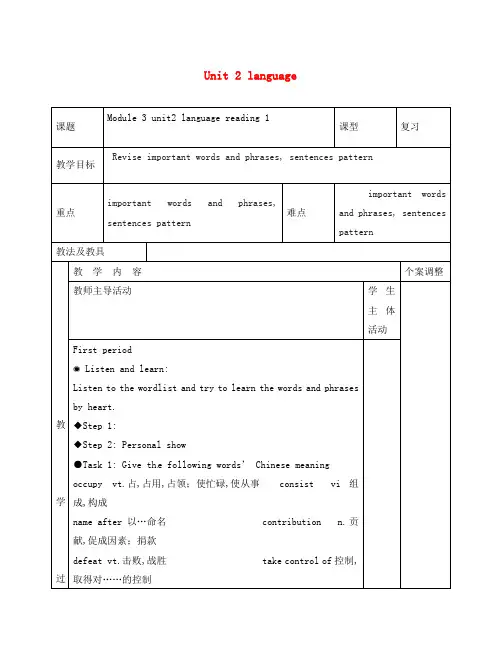
Unit 2 language课题Module 3 unit2 language reading 1课型复习教学目标Revise important words and phrases, sentences pattern重点important words and phrases,sentences pattern难点important wordsand phrases, sentencespattern教法及教具教学过教学内容个案调整教师主导活动学生主体活动First periodListen and learn:Listen to the wordlist and try to learn the words and phrasesby heart.◆Step 1:◆Step 2: Personal show●Task 1: Give the following words’ Chinese meaningoccupy vt.占,占用,占领;使忙碌,使从事consist vi组成,构成name after 以…命名contribution n.贡献,促成因素;捐款defeat vt.击败,战胜take control of控制,取得对……的控制程lead to 导致replace vt替换,代替,取代raise vt.养育,培养,举起,增加,提高,筹募,提及embarrass vt.使难堪,使尴尬concern n.关切;忧虑vt.涉及;使…担心,对…感兴趣differ from和…不同,不同于stand for 代表,象征appearance n. 出现;外观,外貌simplify νt. 简化as a whole 作为整体,总体上shortcoming n.短处,缺点version n.版本●Task 2: Translate the following wordsn. 过程;进程process n.差别;区别distinctionadj. 纯的,纯洁的,纯粹的pure a. 独特的;极不寻常的 uniquevt. 进入,使用n. 通道, (使用的)机会,权利access a.温柔的;平和的gentlen. (书写或印刷)文字,角色;符号,性格 character n.结论,推论conclusionn.习惯,风俗,惯例custom adj. 错误的,误解的mistakenvt.代表;展示,描绘represent νt. & νi.组合, (使)联合combinevt. 显示,表示,象征,暗示indicate a. 方便的convenienta.实用的;(切实)可行的practical ad.因此,所以thereforeStep 3: Text reading Listen to the text and then finish the following sentences●Task 1: Fill in the blanks according to the text1. That is why English has so many difficult rules _________(让人迷惑的). (that confuse people)2. Old English __________ (包含) a mixture of their la nguages. (consisted of / was made up of)3. _________ (除了) place names such as London, very few Celtic words __________ (成为的部分) Old English. (Aside from; became part of)4. When we speak English today, we sometimes _____________ (感到迷惑) which words or phrases to use.(feel puzzled about)5. Many things _______ (起到作用) the development of this new type of English. (played a part in)6. ________(尽管) the Normans spoke French for the entire 250 years they ruled England, French did not ______ English ______ (取代…作为) the first language. (Even though; replace; as)7. Old French _____ other ________(对产生了促进作用) Middle English as well. (made; contributions to)8. __________ (可以肯定的是) that this process will continue, and people will keep inventing new words and new ways of saying things. (It is certain)Task 2: Task-ba sed reading阅读课文, 完成下表。
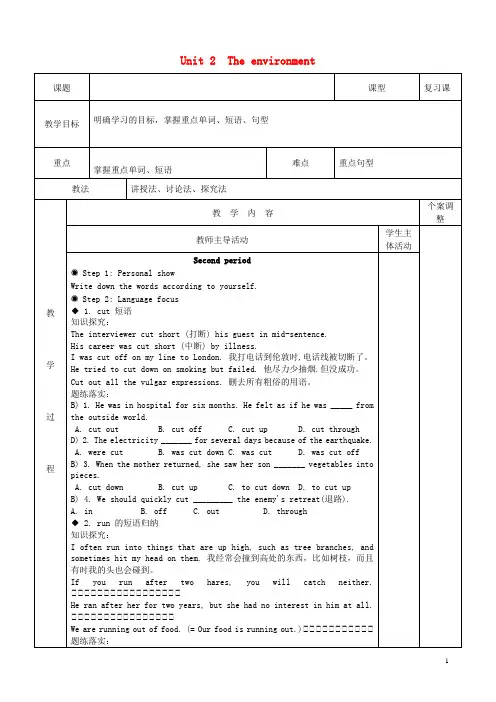
Unit 2 The environment课题课型复习课教学目标明确学习的目标,掌握重点单词、短语、句型重点掌握重点单词、短语难点重点句型教法讲授法、讨论法、探究法教学过程教学内容个案调整教师主导活动学生主体活动Second periodStep 1: Personal showWrite down the words according to yourself.Step 2: Language focus◆ 1. cut 短语知识探究:The interviewer cut short (打断) his guest in mid-sentence.His career was cut short (中断) by illness.I was cut off on my line to London. 我打电话到伦敦时,电话线被切断了。
He tried to cut down on smoking but failed. 他尽力少抽烟.但没成功。
Cut out all the vulgar expressions. 删去所有粗俗的用语。
题练落实:B) 1. He was in hospital for six months. He felt as if he was _____ fromthe outside world.A. cut outB. cut offC. cut upD. cut throughD) 2. The electricity _______ for several days because of the earthquake.A. were cutB. was cut downC. was cutD. was cut offB) 3. When the mother returned, she saw her son _______ vegetables intopieces.A. cut downB. cut upC. to cut downD. to cut upB) 4. We should quickly cut _________ the enemy's retreat(退路).A. inB. offC. outD. through◆ 2. run 的短语归纳知识探究:I often run into things that are up high, such as tree branches, andsometimes hit my head on them. 我经常会撞到高处的东西,比如树枝,而且有时我的头也会碰到。
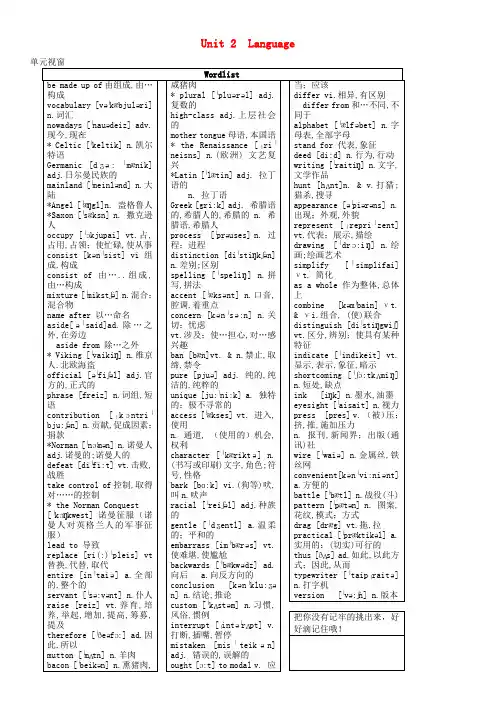
Unit 2 LanguageEnglish and its history Focus All through history, people from many different countries andcultures have lived together in Britain. The English language is madeup of the grammar and vocabulary these people brought to Britain. Thatis why English has so many difficult rules that confuse people.Old EnglishOld English is very different from the English we speak nowadays.In fact, we would not be able to understand it if we heard it today.Before the middle of the 5th century, people in Britain all spoke alanguage called Celtic. Then two Germanic groups from the European mainland—the Angles and the Saxons—occupied Britain. Old English consisted of a mixture of their languages. (Both the English language and the English people are named after the Angles; the word Angle was spelt Engle in Old English.) Aside from place names such as London, very few Celtic words became part of Old English. At the end of the 9th century, the Vikings, people from Northern European countries such as Denmark and Norway, began to move to Britain. They brought with them their languages, which also mixed with Old English. By the 10th century, Old English had become the official language of England.When we speak English today, we sometimes feel puzzled about which words or phrases to use. This is because English has many words and phrases from different languages, but with similar meanings. For example, the word sick came from a word once used by the Angles and the Saxons, while ill came from a word once used by the Norwegians.Middle EnglishMiddle English is the name given to the English used from around the 12th to the 15th centuries. Many things played a part in the development of this new type of English. The most important contribution was from the Normans, a French-speaking peop le who defeated England and took control of the country in 1066. However, the Norman Conquest did not affect English as much as the Angles and the Saxons' victory about 600 years earlier, which led to Old English replacing Celtic. Even though the Normans spoke French for the entire 250 years they ruled England, French did not replace English as the first language. On the other hand, the English language did borrow many words from French. This resulted in even more words with similar meanings, such as answer (from Old English) and reply (from Old French). It is interesting to learn how the words for animals and meat developed. After the Norman Conquest, many English people worked as servants who raised animals. Therefore, the words we use for most animals raised for food, such as cow, sheep and pig, came from Old English. However, the words for the meat of these animals, which was served to the Normans, came from Old French: beef, mutton, pork and bacon.Old French made other contributions to Middle English as well. In Old English, the Germanic way of making words plural was used. For example, they said housen instead of houses, and shoen instead of shoes. After the Normans took control, they began using the French way of making 1. occupy2. consist3. contributi onplurals, adding an -s to house and shoe. Only a few words kept theirGermanic plural forms, such as man/ men and child/ children.After the Norman Conquest, high-class people spoke French whilecommon people spoke English. However, by the latter half of the 14thcentury, English had come into widespread use among all classes inEngland. In 1399, Henry IV became King of England. His mother tonguewas English, and he used English for all official events.Modern EnglishModern English appeared during the Renaissance in the 16th century.Because of this, Modern English includes many Latin and Greek words.Pronunciation also went through huge changes during this period. Ofcourse, this was not the end of the changes in the English language.The question of whether English will keep on changing in the future iseasy to answer. It is certain that this process will continue, and peoplewill keep inventing new words and new ways of saying things.First periodListen and learn:Listen to the wordlist and try to learn the words and phrases by heart.◆Step 1:◆Step 2: Personal show●Task 1: Give the following words’ Chinese meaningoccupy vt. consist viname after contribution n.defeat vt. take control oflead to replace vtraise vt. embarrass vt.concern n. vt. differ fromstand for appearance n.simplify νt.as a wholeshortcoming n. version n.●Task 2: Translate the following wordsn. 过程;进程n.差别;区别adj. 纯的,纯洁的,纯粹的 a. 独特的;极不寻常的vt. 进入,使用n. 通道, (使用的)机会,权利 a.温柔的;平和的n. (书写或印刷)文字,角色;符号,性格n.结论,推论n.习惯,风俗,惯例adj. 错误的,误解的vt.代表;展示,描绘νt. & νi.组合, (使)联合vt. 显示,表示,象征,暗示 a. 方便的a.实用的;(切实)可行的ad.因此,所以Step 3: Text reading Listen to the text and then finish the following sentences●Task 1: Fill in the blanks according to the text1. That is why English has so many difficult rules _________(让人迷惑的).2. Old English __________ (包含) a mixture of their languages.3. _________ (除了) place names such as London, very few Celtic words __________ (成为的部分) Old English.4. When we speak English today, we sometimes _____________ (感到迷惑) which words or phrases to use.5. Many things _______ (起到作用) the development of this new type of English.6. ________(尽管) the Normans spoke French for the entire 250 years they ruled England, French didnot ______ English ______ (取代…作为) the first language.7. Old French _____ other ________(对产生了促进作用) Middle English as well.8. __________ (可以肯定的是) that this process will continue, and people will keep inventing new words and new ways of saying things.Periods Time Relevant 1. _______Old EnglishBefore the middle of the5th centuryPeople in Britain all spoke a languagecalled CelticAt the end of the 9thcenturyAs the Vikings invaded Britain andbrought their languages, old English was3. _____.By the 10th centuryOld English was the official language ofEngland. The language was 4. ____up of anAnglo-Saxon base plus words from thelanguages of Denmark and Norway.MiddleEnglishIn 1066The Normans conquered England and5.______ the country.During 250 years French had an 6. ______ on English.By the latter half of the14th centuryEnglish was 7. ____ by all classes inEngland.In 1399Henry IV used English for all official 8._____.ModernEnglishDuring the Renaissancein the 16th centuryPronunciation 9. _____ huge changes.2. ______People will keep inventing new words andnew ways of 10. ______ things1. Read the text2. Try to recite the sentences in step 3-Task 1Second periodStep 1: Personal showWrite down the words according to the definition1. difficult to understand; puzzling2. be made up of3. cause something to exist4. take the place of5. make (sth) easy to do or understand; make simple6. live in or have possession of7. help to cause sth8. difference or contrast between one person or thing and another9. join or mix together to form a whole10. show sth, especially by pointing11. fitting in well with people's needs or plans;giving no trouble or difficulty; suitable12. suitable for the purpose for which it was made; usefulStep 2: Language focus1. occupy vt.占据,充满(时间,空间,某人的头脑等);(军事)占领(国家,阵地等);占用;占有(房屋,土地等) 知识探究:His speech occupied only 3 minutes. 他的演讲仅占用了三分钟。
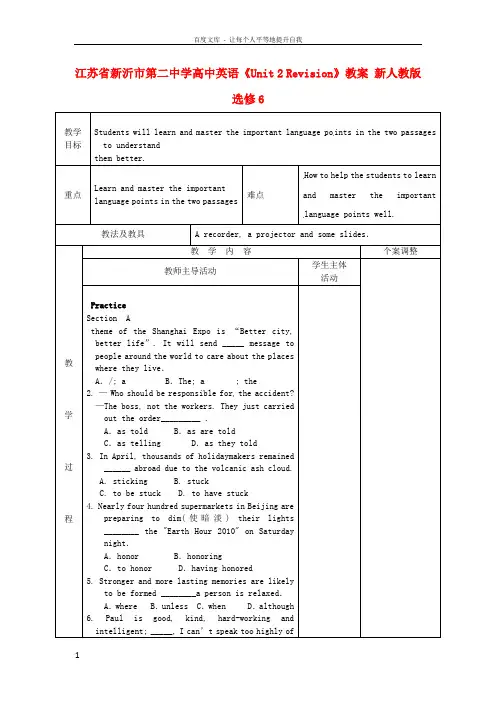
江苏省新沂市第二中学高中英语《Unit 2 Revision》教案新人教版选修6教学目标Students will learn and master the important language po ints in the two passages to understandthem better.重点Learn and master the importantlanguage points in the two passages难点How to help the students to learnand master the importantlanguage points well.教法及教具 A recorder, a projector and some slides.教学过程教学内容个案调整教师主导活动学生主体活动PracticeSection Atheme of the Shanghai Expo is “Better city,better life”. It will send _____ message topeople around the world to care about the placeswhere they live.A./; a B.The; a ; the2. —Who should be responsible for the accident?—The boss, not the workers. They just carriedout the order_________ .A.as told B.as are toldC.as telling D.as they told3. In April, thousands of holidaymakers remained______ abroad due to the volcanic ash cloud.A. stickingB. stuckC. to be stuckD. to have stuck4. Nearly four hundred supermarkets in Beijing arepreparing to dim(使暗淡) their lights________ the "Earth Hour 2010" on Saturdaynight.A.honor B.honoringC.to honor D.having honored5. Stronger and more lasting memories are likelyto be formed ________a person is relaxed.A.where B.unless C.when D.although6. Paul is good, kind, hard-working andintelligent; _____, I can’t speak too highly ofhim.A. as a resultB. in a wordC. by the wayD. on the contrary7. American Indians ________ about five percent ofthe U.S. population.A. fill upB. bring upC. make upD. set up8. How long do you think ________ the computercompany brings out a new product?A. it will be beforeB. will it be untilC. will it be whenD. it will be that9. Much to the couple’s comfort, their income isnow double ______ it was five years ago.A. thatB. thanC. whichD. what10. --- Sorry, I’m late. --- That’s OK. I_______ long. A. haven’t waited B.don’t waitC. haven’t been waitingD. didn’t wait11. It is not like Jack to be unfriendly, so he_______ you when you called.A. can’t have seenB. should not have seenC. must not have seenD. need not have seen12. The people ____ the murderer everywhere whenhe suddenly _______ in the hospital.A. searched for; appearedsearching; was appearingC. were searching for; was appearedsearching for; appeared13. It is known to all that there is ______ as a free lunch.A. no such a thingB. no such thingC. such no thingD. no such things14. __________ different life today is from_________ was fifty years ago!A. What a; whatB. How; whatC. What; whatD. What a; how15. Now that this problem is settled, let’s ______the next item on the agenda (议事日程).A. go on withB. go on discussingC. move on withD. move on to16. She said she would telephone but we _______from her so far.A. haven’t heardB. didn’t hearC. hadn’t heardD. won’t hear17. Don’t get that ink on your shirt, for it ________.A won’t wash outB won’t be washingC isn’t washing outD doesn’t wash out18. --What made her mother so angry? --________.A. Because she didn’t make the most of her timeB. Her not making the best of her timeC. Her time was not made full use ofD. Becaus e of her wasting time19. The biggest risk of a high-sodium(钠)diet isthe ef fect ____ has on blood pressure and heart health.A. itB. whichC. whatD. that20. Some people are worrying about the possibility________ mobile phones could be responsiblefor a range of illnesses, from rashes(皮疹) tobrain tumors.A.that B.why C.how D.whether 21. To improve their oral English, everyone in theclass is supposed to ______ actively in these discussions.A. participateB. attendC. enterD. take22. Don’t ________more work than you can do, oryou will __________ .A. take over; break inB. take on; break downC. take over; break offD. take on; breakintwo men stood ________drunkenly at each other while the crowd looked on with amusement.A. watchingB. glaringC. watchedD. glared24. They were not prepared to ________ the olivebranch to their enemies.A. hold outB. hold onC. hold backD. hold up25. --Do you mind my opening the window?--______ . Fresh air is good for our health.A . Never mind B. No, not at allC. I ‘d rather you didn’tD. Yes , ahead.Section 2Have you booked a hotel room in Salt Lake City?--- Yes, it’s a five-star hotel and offers its guests a wide v______ of amusements.I want to know more details about the story.Please show me more about the story.-- The s________ of the story is a hotel in Paris duri ng the World War Ⅱ.3. -- Did you go to the concert last night?-- Yes, live p____________ was the best! I reallyenjoyed it.4. -- I am weak these days.-- You should try some exercises. Here is a set of exercises which will s________ yourmuscles.5. -- Her grandmother p_______ away last night.-- I’m really sorry to hear that.6. -- We could only see the old actor standing theremoving his lips.-- It seems a_________________ that he got his start in silent films.7. -- I’d like to buy a not ebook.--Whichever you buy, there is a three-year g______________.8. -- Would you like to come to my house and takepart in my birthday party next Friday?-- I am really glad to accept your kind ___________.板书设计教学札记。
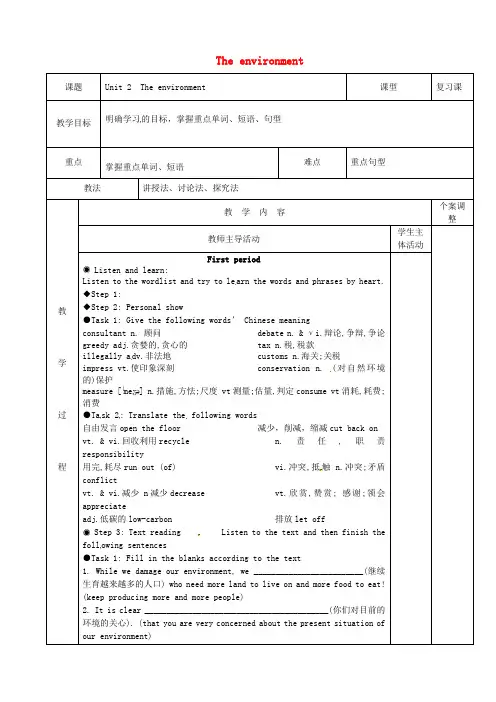
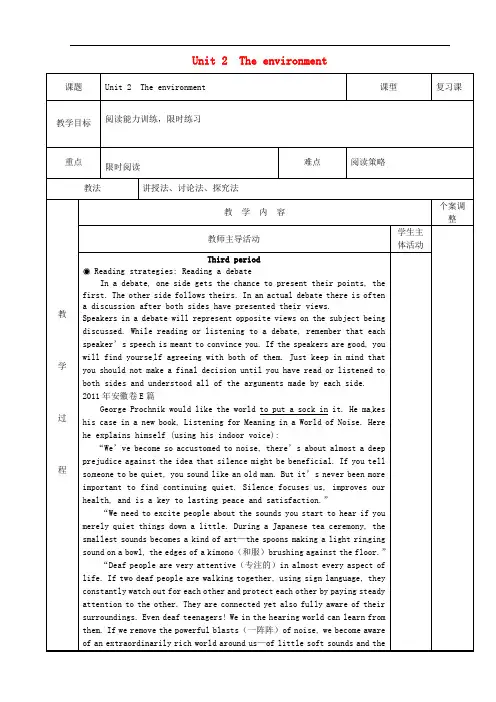
Unit 2 The environment课题Unit 2 The environment课型复习课教学目标阅读能力训练,限时练习重点限时阅读难点阅读策略教法讲授法、讨论法、探究法教学过程教学内容个案调整教师主导活动学生主体活动Third periodReading strategies: Reading a debateIn a debate, one side gets the chance to present their points, thefirst. The other side follows theirs. In an actual debate there is oftena discussion after both sides have presented their views.Speakers in a debate will represent opposite views on the subject beingdiscussed. While reading or listening to a debate, remember that eachspeaker’s speech is meant to convince you. If the speakers are good, youwill find yourself agreeing with both of them. Just keep in mind thatyou should not make a final decision until you have read or listened toboth sides and understood all of the arguments made by each side.2011年安徽卷E篇George Prochnik would like the world to put a sock in it. He ma keshis case in a new book, Listening for Meaning in a World of Noise. Herehe explains himself (using his indoor voice):“We’ve become so accustomed to noise, there’s about almost a deepprejudice against the idea that silence might be beneficial. If you tellsomeone to be quiet, you sound like an old man. But it’s never been moreimportant to find continuing quiet. Silence focuses us, improves ourhealth, and is a key to lasting peace and satisfaction.”“We need to excite people about the sounds you start to hear if youmerely quiet things down a little. During a Japanese tea ceremony, thesmallest sounds becomes a kind of art—the spoons making a light ringingsound on a bowl, the edges of a kimono(和服)brushing against the floor.”“Deaf people are very attentive(专注的)in almost every aspect oflife. If two deaf people are walking together, using sign language, theyconstantly watch out for each other and protect each other by paying steadyattention to the other. They are connected yet also fully aware of theirsurroundings. Even deaf teenagers! We in the hearing world can learn fromthem. If we remove the powerful blasts(一阵阵)of noise, we become awareof an extraordinarily rich world around us—of little soft sounds and thesound of footsteps, of bird songs and ice cracking (开裂声). It’s astonishing how beautiful things sound when you can really listen.”文章介绍了George Prochnik的新著Listening for Meaning in a World of Noise 和他的观点:在喧嚣的世界中创造一方不太纷扰的环境,这个世界会更美好。
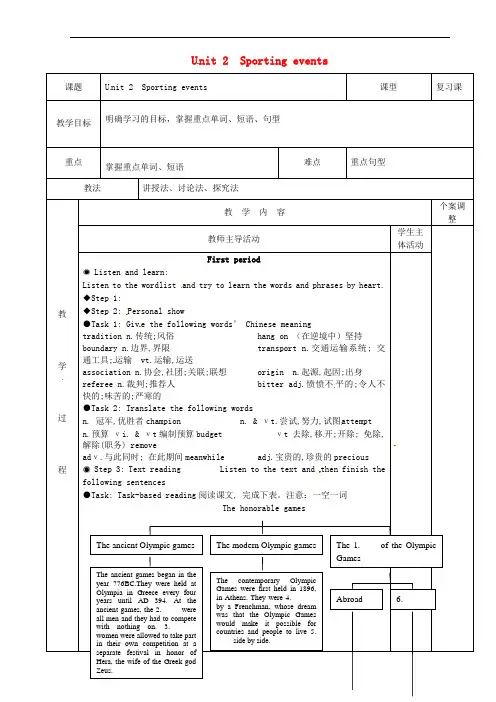
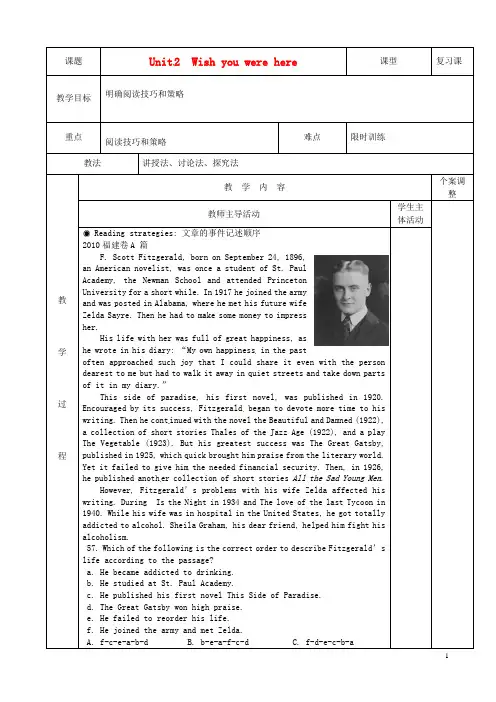
课题Unit2 Wish you were here 课型复习课教学目标明确阅读技巧和策略重点阅读技巧和策略难点限时训练教法讲授法、讨论法、探究法教学过程教学内容个案调整教师主导活动学生主体活动Reading strategies: 文章的事件记述顺序2010福建卷A 篇F. Scott Fitzgerald, born on September 24, 1896,an American novelist, was once a student of St. PaulAcademy, the Newman School and attended PrincetonUniversity for a short while. In 1917 he joined the armyand was posted in Alabama, where he met his future wifeZelda Sayre. Then he had to make some money to impressher.His life with her was full of great happiness, ashe wrote in his diary: “My own happiness in the pastoften approached such joy that I could share it even with the persondearest to me but had to walk it away in quiet streets and take down partsof it in my diary.”This side of paradise, his first novel, was published in 1920.Encouraged by its success, Fitzgerald began to devote more time to hiswriting. Then he cont inued with the novel the Beautiful and Damned (1922),a collection of short stories Thales of the Jazz Age (1922), and a playThe Vegetable (1923). But his greatest success was The Great Gatsby,published in 1925, which quick brought him praise from the literary world.Yet it failed to give him the needed financial security. Then, in 1926,he published anoth er collection of short stories All the Sad Young Men.However, Fitzgerald’s problems with his wife Zelda affected hiswriting. During Is the Night in 1934 and The love of the last Tycoon in1940. While his wife was in hospital in the United States, he got totallyaddicted to alcohol. Sheila Graham, his dear friend, helped him fight hisalcoholism.57. Which of the following is the correct order to describe Fitzgerald’slife according to the passage?a. He became addicted to drinking.b. He studied at St. Paul Academy.c. He published his first novel This Side of Paradise.d. The Great Gatsby won high praise.e. He failed to reorder his life.f. He joined the army and met Zelda.A. f-c-e-a-b-dB. b-e-a-f-c-dC. f-d-e-c-b-aD. b-f-c-d-e-a(09·湖北D篇)A few years ago, Paul Gerner began to gather a group of architectsin Las vegas to ask them what it would take to design a public school that used 50 percent less energy, cost much less to build and obvi ously improved student learning.”I think hal f of then fell off their chairs,”Gerner says.Gerner manages school facilities (设施)for Clark county, Nevada,a district roughly the size of Massachuset ts. By 2018,143,000 additionalstudents will enter the already crowded public-education system. Gerner needs 73 new schools to house them. Four architecture teams have nearly finished d esigning primary school prototypes(样品); They plan to construct their schools starting in 2009. The district will then assess how well the schools perform, and three winners will copy those designs in 50 to 70 new buildings.Green schools are appearing all over, but in Clark County, which stands out for its vastness, such aggressive targets are difficult because design requirements like more natural light for students go against the realities of a desert climate. ”One of the biggest challenges is getting the right site orientation(朝向),” Mark McGinty, a director at SH Architecture, says. His firm recently completed a high school in Las Vegas. “You have the same building, sa me set of windows, but if its orientation is incorrect and it faces the sun, it will be really expensive to cool.”Surprisingly, the man responsible for one of re most progressive green-design competitions has doubts about ideas of eco-friendly buildings. ”I don’t believe in the new green religion,” Gerner says.”Gerner says.”Some of the building technologies systems that allow them to learn about the process of harvesting wind and solar power.”You never know what’s going to start the interest of a chil d to study math and science,” he says.64. Which order of s teps is followed in carrying out the project?A. Assessment-Prototype-Design-Construction.B. Assessment-Design-Prototype-Construction.C. Design-Assessment-Prototype-Construction.D. Design-Prototype-Assessment-Construction.板书设计当堂作业课外作业教学札记。
江苏省新沂市第二中学高中英语《Unit 2 Task (2)》教案新人教版选修6教学目标1.Provide students with opportunities to learn and practice their language skills of listening, spe aking, reading and writing.2.Enable students to identify negative emotional language.重点1. Negative emotional language2. Give advice to s olve problems难点1.Giving advice to solve theproblems.2. Writing an article .教法及教具 A recorder, a projector a nd some slides.教学过程教学内容个案调整教师主导活动学生主体活动Step 2: discussing solutionsWhat do you think of Ma Jie’s problem?AnswersSpeech Bubble 1problem: What is his problem?source of information: How did you find out about theproblem?people involved: Who else is involved in the problembesides Ma jie?attempts to solve problem: What has he done to t ry tosolve the problem?results of attempts: what were the results of thesolutions he had tried?things one wishes t o happen: What does he wishes tohappen?work in pairs to make up a dialogue.Skills building 3: giving adviceguidelines of how to make advice clearer and more helpfulto people who need it:Guidelines What to do WhyavoidjudgingUse positive,helpfullanguage; do notsay, ‘It’s wrongfor you to…’People wanthelp but notjudgement oftheir previousbehaviour.give examples Mention asimilar situationwhere youradvice works.People willknow how touse your advice.be specific Give the advicethat can helppeople to solvetheir ownproblems.People can behelped to so lvetheir problems.Step3: writing an articlewrite an article about how Ma Jie solved his problem withthe help of his parents, teachers and coach.discuss and list what you should write:for exa mple:· Ma Jie’s problems·the possible solutions Ma Jie thought of and the reasons why they didn’t work· the advice you gave to Ma Jie板书设计教学札记。
unit 2 language课题unit 2 language reading 2课型复习教学目标Important words and phrases ; sentence patterns重点Important words and phrases ; sentencepatterns难点Important words andphrases,sentence patterns教法及教具教学过程教学内容个案调整教师主导活动学生主体活动Second periodStep 1: Personal showWrite down the words according to the definition1. difficult to understand; puzzling2. be made up of3. cause something to exist4. take the place of5. make (sth) easy to do or understand; make simple6. live in or have possession of7. help to cause sth8. difference or contrast between one person or thing and another9. join or mix together to form a whole10. show sth, especially by pointing11. fitting in well with people's needs or plans;giving no trouble or difficulty; suitable12. suitable for the purpose for which it was made; usefulStep 2: Language focus1. occupy vt.占据,充满(时间,空间,某人的头脑等);(军事)占领(国家,阵地等);占用;占有(房屋,土地等)知识探究:His speech occupied only 3 minutes. 他的演讲仅占用了三分钟。
Unit2 Wish you were here课题Unit2 Wish you were here课型复习课教学目标明确学习的目标,把握考点, 重点句型重点重点单词短语难点重点句型教法讲授法、讨论法、探究法教学过程教学内容个案调整教师主导活动学生主体活动Step 1: Personal showWrite down the words according to the definition1. make somebody frightened2. in total3. something that protects you from attack4. a dark and cool area out of sun5. greater or better than usual6. before something happens7. amazing8. not comfortable9. having large and dangerous waves10. having something as part of group11. things such as food, medicines, etc. that neededby a group of people12. particular place or area13. move around in an area or go from place to place withoutany special purpose or destination14. programme of work to be done or of planned events15. make a visible image of sb /sth; show or suggestStep 2: Language focus◆ 1. whatever pron. &.adj.无论什么,无论何事知识探究:Whatever happens, keep calm. (=No matter what happens, keep calm.)无论发生什么事,都要保持冷静。
江苏省新沂市第二中学高中英语《Unit 2 Revision》教案新人教版选修6教学目标Students will learn and master the important language po ints in the two passages to understandthem better.重点Learn and master the importantlanguage points in the two passages难点How to help the students to learnand master the importantlanguage points well.教法及教具 A recorder, a projector and some slides.教学过程教学内容个案调整教师主导活动学生主体活动PracticeSection A1.________ theme of the Shanghai Expo is “Bettercity, better life”. It will send _____ messageto people around the world to care about theplaces where they live.A./; a B.The; a C.A; theD./; the2. —Who should be responsible for the accident?—The boss, not the workers. They just carriedout the order_________ .A.as told B.as are toldC.as telling D.as they told3. In April, thousands of holidaymakers remained______ abroad due to the volcanic ash cloud.A. stickingB. stuckC. to be stuckD. to have stuck4. Nearly four hundred supermarkets in Beijing arepreparing to dim(使暗淡) their lights________ the "Earth Hour 2010" on Saturdaynight.A.honor B.honoringC.to honor D.having honored5. Stronger and more lasting memories are likelyto be formed ________a person is relaxed.A.where B.unless C.when D.although6. Paul is good, kind, hard-working andintelligent; _____, I can’t speak too highly ofhim.A. as a resultB. in a wordC. by the wayD. on the contrary7. American Indians ________ about five percent ofthe U.S. population.A. fill upB. bring upC. make upD. set up8. How long do you think ________ the computercompany brings out a new product?A. it will be beforeB. will it be untilC. will it be whenD. it will be that9. Much to the couple’s comfort, their income isnow double ______ it was five years ago.A. thatB. thanC. whichD. what10. --- Sorry, I’m late. --- That’s OK. I_______ long. A. haven’t waited B.don’t waitC. haven’t been wai tingD. didn’t wait11. It is not like Jack to be unfriendly, so he_______ you when you called.A. can’t have seenB. should not have seenC. must not have seenD. need not have seen12. The people ____ the murderer everywhere whenhe suddenly _______ in the hospital.A. searched for; appearedB.were searching; was appearingC. were searching for; was appearedD.were searching for; appeared13. It is known to all that there is ______ as a free lunch.A. no such a thingB. no such thingC. such no thingD. no such things14. __________ different life today is from_________ was fifty years ago!A. What a; whatB. How; whatC. What; whatD. What a; how15. Now that this problem is settled, let’s ______the next item on the agenda (议事日程).A. go on withB. go on discussingC. move on withD. move on to16. She said she would telephone but we _______from her so far.A. haven’t heardB. didn’t hearC. hadn’t heardD. won’t hear17. Don’t get that ink on your shir t, for it ________.A won’t wash outB won’t be washingC isn’t washing outD doesn’t wash out18. --What made her mother so angry? --________.A. Because she didn’t make the most of her timeB. Her not making the best of her timeC. Her time was not made full use ofD. Becaus e of her wasting time19. The biggest risk of a high-sodium(钠)diet isthe ef fect ____ has on blood pressure and heart health.A. itB. whichC. whatD. that20. Some people are worrying about the possibility________ mobile phones could be responsiblefor a range of illnesses, from rashes(皮疹) tobrain tumors.A.that B.why C.how D.whether 21. To improve their oral English, everyone in theclass is supposed to ______ actively in these discussions.A. participateB. attendC. enterD. take22. Don’t ________more work than you can do, oryou will __________ .A. take over; break inB. take on; break downC. take over; break offD. take on; breakin23.The two men stood ________drunkenly at eachother while the crowd looked on with amusement.A. watchingB. glaringC. watchedD. glared24. They were not prepared to ________ the olivebranch to their enemies.A. hold outB. hold onC. hold backD. hold up25. --Do you mind my opening the window?--______ . Fresh air is good for our health.A . Never mind B. No, not at allC. I ‘d rather you didn’tD. Yes ,ahead.Section 21.--- Have you booked a hotel room in Salt LakeCity?--- Yes, it’s a five-star hotel and offers its guests a wide v______ of amusements.2.-- I want to know more details about the story.Please show me more about the story.-- The s________ of the story is a hotel in Paris during the World War Ⅱ.3. -- Did you go to the concert last night?-- Yes, live p____________ was the best! I really enjoyed it.4. -- I am weak these days.-- You should try some exercises. Here is a set of exercises which will s________ yourmuscles.5. -- Her grandmother p_______ away last night.-- I’m really sorry to hear that.6. -- We could only see the old actor standing theremoving his lips.-- It seems a_________________ that he got his start in silent films.7. -- I’d like to buy a notebook.--Whichever you buy, there is a three-year g______________.8. -- Would you like to come to my house and takepart in my birthday party next Friday?-- I am really glad to accept your kind ___________.板书设计。
教学过程Listen and learn:Listen to the wordlist and try to learn the words and phrases by heart.◆Step 1:◆Step 2: Personal show●Task 1: Give the following words’ Chinese meaning adventure n.冒险,冒险经历desert n. 沙漠 vt. 抛弃,舍弃shade n. 阴凉处;背阴;树荫uncomfortable adj. 不舒服的, 不自在的advance n. 前进;预先 vi. 前进,进步supply n.供给,补给νt.提供in advance 提前,进步defence n. 防御,保护schedule n.日程表,时间表, 进度表explore vt. & vi. 探索;勘探view vt. 观看,看待n. 景色,风景,观点classic adj. 经典的n. 经典作品surrounding νt. 周围的,附近的officially adv. 官方地,正式地●Task 2: Translate the following wordsvt. & vi. 安排 arrange adj. 汹涌的;粗糙的;大概的roughn.保护protection n. 空气,大气层;氛围atmosp heren. 目的地destination n.公路,干道,交通要道highwayn.地点,场所spot vt. 反射(声、光、热等),反映reflectvi. & vt. 漫游,游荡; 徘徊,漂泊wander n. 和谐, 协调, 融洽harmonyadj.无穷无尽的, 没完没了的endless adj.平和的,温和的mild Step 3: Text reading Listen to the text and then finish the following sentences●Task 1: Fill in the blanks according to the text1. I've been quite busy ________ (安排) my holiday with my older brother, Colin. (arranging)2. You have to wear a helmet and a life jacket _______(作为保护), just ______ (以防,以免)you fall into the water. (for protection; in case)3. We'll live with the local people in their villages, and eat and drink _______(他们吃喝的任何东西) , ________ (包括) cow's blood! (whatever they do; including)4. Since we'll be walking for almost two weeks, I'll need to buya large backpack _______ (事先) ____________ (来装我的供给品食物和水). (in advance; to carry my supplies of food and water) 5. We'll try to get ____________ (尽可能近地) to the animals, even though they're dangerous, ______(以便) I can take some really good photographs. (as close as possible; so that)6. Our guides will have guns with them __________ (作为防护). (for defen se)7. Mountain climbing ______ (可能) be very tiring, and many people feel sick ________ (随着空气变得稀薄) . (can; as the air gets thinner)●Task 2: Task-based reading阅读课文, 完成下表。
百度文库- 让每个人平等地提升自我Unit 2 Wish you were here单元视窗Wordlistadventure[ədˈventʃə] n.冒险,冒险经历arrange [əˈreindʒ] vt. & vi. 安排extraordinary [ikˈstr ɔ:dinəri]adj. 不同寻常的flight [flait]n. 航班;空中航行camel [ˈkæməl]n.骆驼desert ['dezət] n. 沙漠[diˈzə:t] vt. 抛弃,舍弃dusty [ˈdʌsti]adj.尘土飞扬的,满是灰尘的shade[ʃeid]n. 阴凉处;背阴;树荫brilliant [ˈbriliənt] adj. 明亮的,鲜艳的flashlight ['flæʃlait]n. 手电筒altogether [ˌɔ:ltəˈgeðə]adv. 总共uncomfortable [ʌnˈkʌmftəb əl]adj. 不舒服的, 不自在的rough [rʌf]adj. 汹涌的;粗糙的;大概的white-water rafting n.白浪漂流,激浪漂流helmet [ˈhelmit]n.头盔life jacket救生衣protection [prəˈtekʃən]n.保护in case 万一backpack ['bækpæk]n. 背包advance[ədˈvɑ:ns] n. 前进;预先 vi. 前进,进步in advance 提前,进步supply[səˈplai] n.供给,补给νt.提供wildlife n. 野生动物;野生生物photograph[ˈfəutəgrɑ:f]n. 照片defence [diˈfens]n. 防御,保护scare [skɛə] νt.使恐惧,惊吓up close靠近地mount[maunt] n. 山,山峰tiring['taiəiŋ]adj.让人疲劳的,累人的atmosphere['ætməsfiə] n.空气,大气层African['æfrikən] adj.非洲的 n.非洲人afterwards [ˈɑ:ftəwədz]ad.以后,后来,然后sleeve [sli:v] n. 袖子cheek[tʃi:k] n. 脸颊tourism [ˈtuərizəm]n. 旅游业schedule[ˈʃedju:l] n.日程表,时间表, 进度表crane [krein] n. 鹤explore [ikˈsplɔ:]vt. & vi. 探索;勘探sunrise [ˈsʌnraiz] n日出view[vju:] vt. 观看,看待n. 景色,风景,观点heaven[ˈhevən] n. 天堂;天空mountaintop ['mauntintɔp]n. 山顶temple[ˈtempəl] n. 寺院bury[ˈberi] v. 埋葬,埋藏destination[ˌdestiˈneiʃən]n. 目的地cage[keidʒ] n. 笼子beauty [ˈbju:ti] n.美;美景;美人south-west n.西南方 adj.西南方的 adv.在西南方,向西南方highway n.公路,干道,交通要道classic[ˈklæsik] adj. 经典的n. 经典作品novel [ˈnɔvəl] n. (长篇)小说kingdom[ˈkiŋdəm] n.王国steep[sti:p] adj. 陡峭的;急剧的forever [fəˈrevə]adv.永远的officially [əˈfiʃəli] adv.官方地,正式地spot [spɔt]n.地点,场所tourist[ˈtuərist] spot旅游点publish [ˈpʌbliʃ] vt.出版announce[əˈnauns]vt.宣布,宣称tower [ˈtauə] νi.高耸,屹立:高高升起 n.塔,塔楼sunshine[ˈsʌnʃain]n. 阳光reflect [riˈflekt] vt.反射(声、光、热等),反映diamond [ˈdaiəmənd]n. 钻石,金刚石cattle[ˈkætl] n. 牛wander[ˈwɔndə] vi. & vt.漫游,游荡; 徘徊,漂泊surrounding[səˈraundiŋ]νt. 周围的,附近的harmony [ˈhɑ:məni]n. 和谐, 协调, 融洽endless[ˈendlis]adj.无穷无尽的, 没完没了的mild[maild] adj.平和的,温和的把你没有记牢的挑出来,好好滴记住哦!An adventure in Africa Focus 30th JuneDear Aihua,How are you? Sorry I haven't written for so long. I've been quite busyarranging my holiday with my older brother, Colin. Colin and I plan tospend a few weeks traveling before he goes to university. We're goingto visit so many exciting places and do lots of extraordinary things.We will go to Africa first. I can't wait! Have you been there?We leave London on 15th July, and we'll be taking a flight to Morocco,in northern Africa. We're going to ride camels through the Sahara Desert.It's the biggest desert in the world—about the size of the US! I expectit will be very hot, dry and dusty there. We'll be traveling by camel,with local guides, camping in tents and sleeping on the ground. I'veheard that, in the Sahara, there is no shade during the day, and thestars seem especially brilliant on clear nights. I’ll bring aflashlight with me so that I'll be able to see in the dark. Altogether,the trip will take six days. That means I'll have to sit on a camel foralmost a week—how uncomfortable! I hope my camel likes me!After the trip by camel, we're going to travel down the River Nile. We'llstart at Lake Victoria. A little way down the river from Lake Victoria,the water actually gets quite rough. So, we'll go white-water rafting.It's quite dangerous, but very exciting! You have to wear a helmet anda life jacket for protection, just in case you fall into the water.Then, we're going on a trip to see wild animals in Kenya. We'll livewith the local people in their villages, and eat and drink whatever theydo, including cow's blood! Do you think I should drink it?Since we'll be walking for almost two weeks, I'll need to buy a largebackpack in advance to carry my supplies of food and water. During theday, we'll walk across the land, following the tracks of wildlife suchas elephants, lions and giraffes. We'll try to get as close as possibleto the animals, even though they're dangerous, so that I can take somereally good photographs. But don't worry about me. Our guides will haveguns with them for defense—They can use the guns to scare the animalsaway if they come too near. I really want to see an elephant up close.Colin wants to see a giraffe.After that, we'll be moving on to Tanzania, where we're going to climbMount Kilimanjaro. Mountain climbing can be very tiring, and many peoplefeel sick as the atmosphere gets thinner, so Colin and I will make surethat we will get plenty of rest. The African part of our trip will takeabout four weeks. Afterwards, we're going to the Himalayas.I send you postcards from all the different places we visit!Love,TobyFirst periodListen and learn:Listen to the wordlist and try to learn the words and phrases by heart.◆Step 1:◆Step 2: Personal show●Task 1: Give the following words’ Chinese meaningadventure n. desert n. vt.shade n. uncomfortable adj.advance n. vi. supply n. νt.in advance defence n.schedule n. explore vt. & vi.view vt. n. classic adj. n.surrounding νt.officially adv.●Task 2: Translate the following wordsvt. & vi. 安排adj. 汹涌的;粗糙的;大概的n.保护n. 空气,大气层;氛围n. 目的地n.公路,干道,交通要道n.地点,场所vt. 反射(声、光、热等),反映vi. & vt. 漫游,游荡; 徘徊,漂泊n. 和谐, 协调, 融洽adj.无穷无尽的, 没完没了的adj.平和的,温和的Step 3: Text reading Listen to the text and then finish the following sentences●Task 1: Fill in the blanks according to the text1. I've been quite busy ________ (安排) my holiday with my older brother, Colin.2. You have to wear a helmet and a life jacket _______(作为保护), just ______ (以防,以免)you fall into the water.3. We'll live with the local people in their villages, and eat and drink _______(他们吃喝的任何东西) , ________ (包括) cow's blood!4. Since we'll be walking for almost two weeks, I'll need to buy a large backpack _______ (事先) ____________ (来装我的供给品食物和水).5. We'll try to get ____________ (尽可能近地) to the animals, even though they're dangerous, ______(以便) I can take some really good photographs.6. Our guides will have guns with them __________ (作为防护).7. Mountain climbing ______ (可能) be very tiring, and many people feel sick ________ (随着空气变得稀薄) .●Task 2: Task-based reading阅读课文, 完成下表。
Unit 2 Wish you were here单元视窗Wordlistadventure[ədˈventʃə] n.冒险,冒险经历arrange [əˈreindʒ] vt. & vi. 安排extraordinary [ikˈstr ɔ:dinəri]adj. 不同寻常的flight [flait]n. 航班;空中航行camel [ˈkæməl]n.骆驼desert ['dezət] n. 沙漠[diˈzə:t] vt. 抛弃,舍弃dusty [ˈdʌsti]adj.尘土飞扬的,满是灰尘的shade[ʃeid]n. 阴凉处;背阴;树荫brilliant [ˈbriliənt] adj. 明亮的,鲜艳的flashlight ['flæʃlait]n. 手电筒altogether [ˌɔ:ltəˈgeðə]adv. 总共uncomfortable [ʌnˈkʌmftəb əl]adj. 不舒服的, 不自在的rough [rʌf]adj. 汹涌的;粗糙的;大概的white-water rafting n.白浪漂流,激浪漂流helmet [ˈhelmit]n.头盔life jacket救生衣protection [prəˈtekʃən]n.保护in case 万一backpack ['bækpæk]n. 背包advance[ədˈvɑ:ns] n. 前进;预先 vi. 前进,进步in advance 提前,进步supply[səˈplai] n.供给,补给νt.提供wildlife n. 野生动物;野生生物photograph[ˈfəutəgrɑ:f]n. 照片defence [diˈfens]n. 防御,保护scare [skɛə] νt.使恐惧,惊吓up close靠近地mount[maunt] n. 山,山峰tiring['taiəiŋ]adj.让人疲劳的,累人的atmosphere['ætməsfiə] n.空气,大气层African['æfrikən] adj.非洲的 n.非洲人afterwards [ˈɑ:ftəwədz]ad.以后,后来,然后sleeve [sli:v] n. 袖子cheek[tʃi:k] n. 脸颊tourism [ˈtuərizəm]n. 旅游业schedule[ˈʃedju:l] n.日程表,时间表, 进度表crane [krein] n. 鹤explore [ikˈsplɔ:]vt. & vi. 探索;勘探sunrise [ˈsʌnraiz] n日出view[vju:] vt. 观看,看待n. 景色,风景,观点heaven[ˈhevən] n. 天堂;天空mountaintop ['mauntintɔp]n. 山顶temple[ˈtempəl] n. 寺院bury[ˈberi] v. 埋葬,埋藏destination[ˌdestiˈneiʃən]n. 目的地cage[keidʒ] n. 笼子beauty [ˈbju:ti] n.美;美景;美人south-west n.西南方 adj.西南方的 adv.在西南方,向西南方highway n.公路,干道,交通要道classic[ˈklæsik] adj. 经典的n. 经典作品novel [ˈnɔvəl] n. (长篇)小说kingdom[ˈkiŋdəm] n.王国steep[sti:p] adj. 陡峭的;急剧的forever [fəˈrevə]adv.永远的officially [əˈfiʃəli] adv.官方地,正式地spot [spɔt]n.地点,场所tourist[ˈtuərist] spot旅游点publish [ˈpʌbliʃ] vt.出版announce[əˈnauns]vt.宣布,宣称tower [ˈtauə] νi.高耸,屹立:高高升起 n.塔,塔楼sunshine[ˈsʌnʃain]n. 阳光reflect [riˈflekt] vt.反射(声、光、热等),反映diamond [ˈdaiəmənd]n. 钻石,金刚石cattle[ˈkætl] n. 牛wander[ˈwɔndə] vi. & vt.漫游,游荡; 徘徊,漂泊surrounding[səˈraundiŋ]νt. 周围的,附近的harmony [ˈhɑ:məni]n. 和谐, 协调, 融洽endless[ˈendlis]adj.无穷无尽的, 没完没了的mild[maild] adj.平和的,温和的把你没有记牢的挑出来,好好滴记住哦!An adventure in Africa Focus 30th JuneDear Aihua,How are you? Sorry I haven't written for so long. I've been quite busyarranging my holiday with my older brother, Colin. Colin and I plan tospend a few weeks traveling before he goes to university. We're goingto visit so many exciting places and do lots of extraordinary things.We will go to Africa first. I can't wait! Have you been there?We leave London on 15th July, and we'll be taking a flight to Morocco,in northern Africa. We're going to ride camels through the Sahara Desert.It's the biggest desert in the world—about the size of the US! I expectit will be very hot, dry and dusty there. We'll be traveling by camel,with local guides, camping in tents and sleeping on the ground. I'veheard that, in the Sahara, there is no shade during the day, and thestars seem especially brilliant on clear nights. I’ll bring aflashlight with me so that I'll be able to see in the dark. Altogether,the trip will take six days. That means I'll have to sit on a camel foralmost a week—how uncomfortable! I hope my camel likes me!After the trip by camel, we're going to travel down the River Nile. We'llstart at Lake Victoria. A little way down the river from Lake Victoria,the water actually gets quite rough. So, we'll go white-water rafting.It's quite dangerous, but very exciting! You have to wear a helmet anda life jacket for protection, just in case you fall into the water.Then, we're going on a trip to see wild animals in Kenya. We'll livewith the local people in their villages, and eat and drink whatever theydo, including cow's blood! Do you think I should drink it?Since we'll be walking for almost two weeks, I'll need to buy a largebackpack in advance to carry my supplies of food and water. During theday, we'll walk across the land, following the tracks of wildlife suchas elephants, lions and giraffes. We'll try to get as close as possibleto the animals, even though they're dangerous, so that I can take somereally good photographs. But don't worry about me. Our guides will haveguns with them for defense—They can use the guns to scare the animalsaway if they come too near. I really want to see an elephant up close.Colin wants to see a giraffe.After that, we'll be moving on to Tanzania, where we're going to climbMount Kilimanjaro. Mountain climbing can be very tiring, and many peoplefeel sick as the atmosphere gets thinner, so Colin and I will make surethat we will get plenty of rest. The African part of our trip will takeabout four weeks. Afterwards, we're going to the Himalayas.I send you postcards from all the different places we visit!Love,TobyFirst periodListen and learn:Listen to the wordlist and try to learn the words and phrases by heart.◆Step 1:◆Step 2: Personal show●Task 1: Give the following words’ Chinese meaningadventure n. desert n. vt.shade n. uncomfortable adj.advance n. vi. supply n. νt.in advance defence n.schedule n. explore vt. & vi.view vt. n. classic adj. n.surrounding νt. officially adv.●Task 2: Translate the following wordsvt. & vi. 安排adj. 汹涌的;粗糙的;大概的n.保护n. 空气,大气层;氛围n. 目的地n.公路,干道,交通要道n.地点,场所vt. 反射(声、光、热等),反映vi. & vt. 漫游,游荡; 徘徊,漂泊n. 和谐, 协调, 融洽adj.无穷无尽的, 没完没了的adj.平和的,温和的Step 3: Text reading Listen to the text and then finish the following sentences●Task 1: Fill in the blanks according to the text1. I've been quite busy ________ (安排) my holiday with my older brother, Colin.2. You have to wear a helmet and a life jacket _______(作为保护), just ______ (以防,以免)you fall into the water.3. We'll live with the local people in their villages, and eat and drink _______(他们吃喝的任何东西) , ________ (包括) cow's blood!4. Since we'll be walking for almost two weeks, I'll need to buy a large backpack _______ (事先) ____________ (来装我的供给品食物和水).5. We'll try to get ____________ (尽可能近地) to the animals, even though they're dangerous, ______(以便) I can take some really good photographs.6. Our guides will have guns with them __________ (作为防护).7. Mountain climbing ______ (可能) be very tiring, and many people feel sick ________ (随着空气变得稀薄) .1. Read the text2. Try to recite the sentences in step 3-Task 1Second periodStep 1: Personal showWrite down the words according to the definition1. make somebody frightened2. in total3. something that protects you from attack4. a dark and cool area out of sun5. greater or better than usual6. before something happens7. amazing8. not comfortable9. having large and dangerous waves10. having something as part of group11. things such as food, medicines, etc. that neededby a group of people12. particular place or area13. move around in an area or go from place to place withoutany special purpose or destination14. programme of work to be done or of planned events15. make a visible image of sb /sth; show or suggestStep 2: Language focus◆ 1. whatever pron. &.adj.无论什么,无论何事知识探究: Whatever happens, keep calm. (=No matter what happens, keep calm.)无论发生什么事,都要保持冷静。